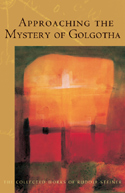
-
APPROACHING THE MYSTERY OF GOLGOTHA
Rudolf Steiner

In February of 1913 - a landmark year for Rudolf Steiner and Anthroposophy - the first General Meeting of the Anthroposophical Society was held. In September, the Foundation Stone for the Goetheanum was laid in Dornach. The ground for Anthroposophy as we know it today was established.
Such is the background for the remarkable lectures contained in this volume. Outwardly, they begin to set the record straight. Inwardly, they seek to establish a right relationship of service to Christ and the spiritual worlds in accord with the spirit of the times, the archangel Michael. For the first time, Rudolf Steiner reveals openly the need for a true "Michael School" and that he and Anthroposophy, the fruit of his spiritual research, are earthly representatives of Michael.
Christ and Michael are the explicit guiding lights of this collection, which itself represents a profound act of Christ-Michael service. With courage, devotion, and conviction, Rudolf Steiner, now free and independent, the "teacher" of his own "school," sets about unveiling the truth and reality, as he knows it. Again and again, he returns to the sacrificial deeds of Christ - creative, sustaining, and enabling our humanity - before, during, and after Golgotha.
The teaching at the heart of this volume, as it is at the heart of the Christ, is selflessness the overcoming of egotism and the primacy of the other.
"We must become selfless - that is the task of culture today for the future. Human beings must become more and more selfless. Therein lies the future of right moral life actions, the future of all acts of love that can occur through earthly humanity."
This Collected Works edition contains a new introduction, a chronology of Rudolf Steiner's life, and an index. This volume is a translation of Vorstufen zum Mysterium von Golgatha (GA 152).
RUDOLF STEINER (1861-1925) called his spiritual philosophy 'anthroposophy', meaning 'wisdom of the human being'. As a highly developed seer, he based his work on direct knowledge and perception of spiritual dimensions. He initiated a modern and universal 'science of spirit', accessible to anyone willing to exercise clear and unprejudiced thinking. From his spiritual investigations Steiner provided suggestions for the renewal of many activities, including education (both general and special), agriculture, medicine, economics, architecture, science, philosophy, religion and the arts.
Today there are thousands of schools, clinics, farms and other organizations involved in practical work based on his principles. His many published works feature his research into the spiritual nature of the human being, the evolution of the world and humanity, and methods of personal development. Steiner wrote some 30 books and delivered over 6,000 lectures across Europe. In 1924 he founded the General Anthroposophical Society, which today has branches throughout the world.
October 2006; Trans Michael Millar; Series: The Collected Works of Rudolf Steiner; 10 lectures, various cities, 1913-1914 (GA 152); SB; 208pp; 23 x 15 cm; pb;
£22.50 ISBN 9780880106061

